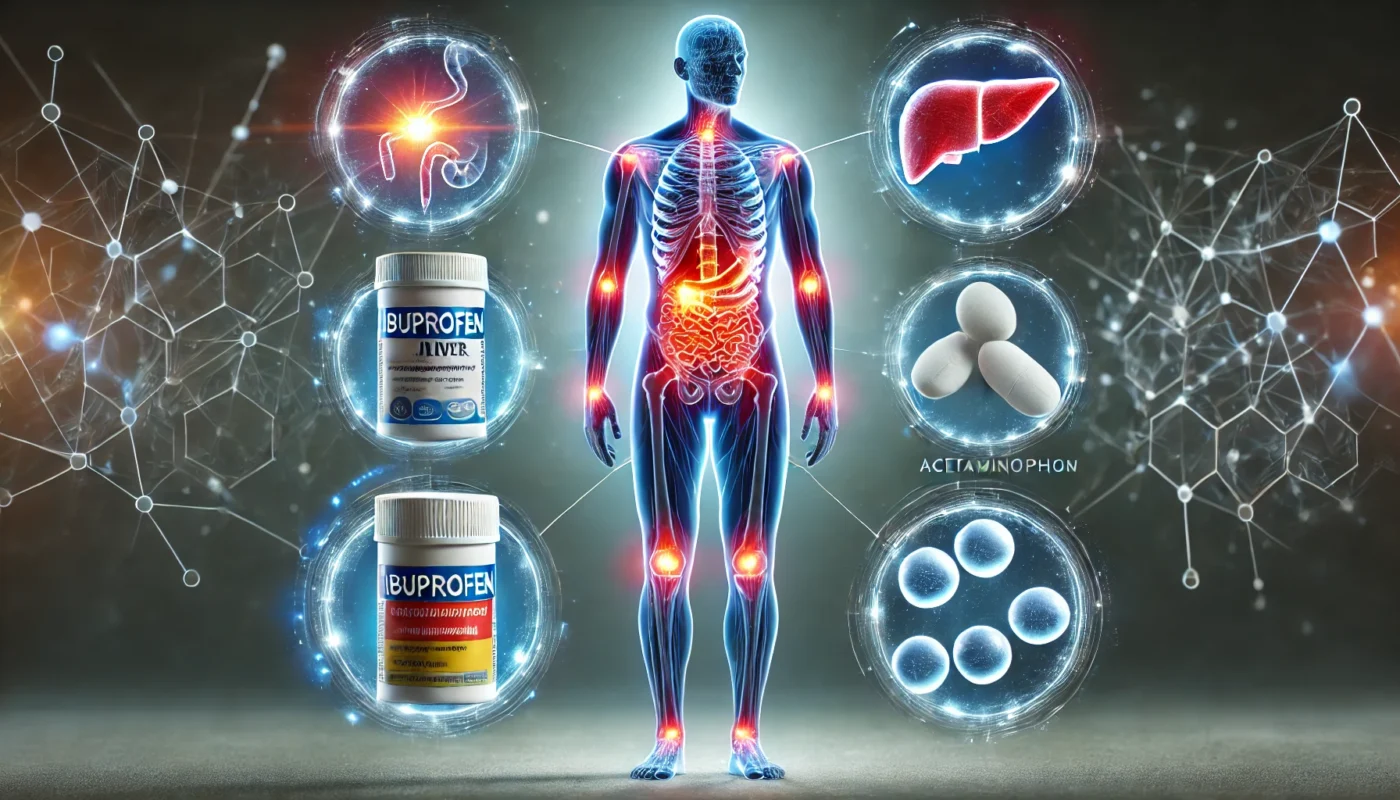There are several categories of OTC pain relievers, each working in different ways to relieve pain. The most common types include:
You may also like: Understanding Long-Term Pain Relief Options
Nonsteroidal Anti-Inflammatory Drugs (NSAIDs)
NSAIDs, like ibuprofen (Advil, Motrin) and naproxen (Aleve), are popular choices for reducing inflammation and relieving pain. They work by blocking the production of certain chemicals in the body that cause inflammation. This makes them particularly effective for conditions involving swelling, such as arthritis or muscle injuries. Furthermore, NSAIDs are also used for menstrual cramps and minor aches from common colds.
Mechanism of Action
The primary action of NSAIDs involves inhibiting cyclooxygenase (COX) enzymes, which play a crucial role in the production of prostaglandins, the chemicals responsible for inflammation, pain, and fever. By curbing these enzymes, NSAIDs reduce the symptoms associated with inflammation.
Common Uses Beyond Pain
NSAIDs are not only for pain relief; they also help reduce fever and can alleviate symptoms of colds and flu. Their ability to decrease swelling and inflammation makes them versatile for various ailments, including sports injuries and post-operative pain.
Considerations for Use
Despite their benefits, NSAIDs are not suitable for everyone. They can cause gastrointestinal issues and increase the risk of cardiovascular events with prolonged use. It’s essential to weigh these risks, particularly for individuals with pre-existing health conditions.
Ibuprofen for Muscle Strain
Ibuprofen is a go-to for many dealing with muscle strain due to its anti-inflammatory properties. It not only helps reduce pain but also limits swelling, facilitating faster recovery.
Benefits for Athletes
Athletes often experience muscle strains and injuries, making ibuprofen a popular choice due to its ability to quickly reduce inflammation and pain, allowing for a quicker return to activities.
Dosage and Administration
For muscle strain, it is crucial to follow the recommended dosage to avoid side effects. Taking ibuprofen with food can help minimize stomach irritation, and using it only when necessary can prevent long-term health issues.
When to Seek Medical Advice
While ibuprofen is effective for minor strains, severe or persistent pain should be evaluated by a healthcare professional to rule out more significant injuries that might require different treatment approaches.
Acetaminophen
Acetaminophen (Tylenol) is another widely used OTC pain reliever. Unlike NSAIDs, it does not have anti-inflammatory properties but is effective in reducing fever and alleviating pain. It’s often recommended for individuals who cannot tolerate NSAIDs due to stomach issues or allergies.
Mechanism and Efficacy
Acetaminophen works by blocking the brain’s perception of pain, offering relief without affecting inflammation. Its efficacy in treating headaches, minor arthritis pain, and reducing fever makes it a staple in medicine cabinets.
Safety and Side Effects
Acetaminophen is generally considered safe when used as directed. However, exceeding the recommended dose can lead to severe liver damage. It’s crucial to be mindful of cumulative doses, especially when using other medications containing acetaminophen.

Who Should Use Acetaminophen?
Individuals with a history of gastrointestinal issues or those at risk for bleeding may prefer acetaminophen over NSAIDs. However, patients with liver disease or heavy alcohol users should consult a healthcare provider before use.
Aspirin
Aspirin, another member of the NSAID family, is often used for its ability to reduce inflammation and pain. Additionally, it has blood-thinning properties, making it useful in preventing heart attacks and strokes in certain individuals.
Dual Role in Pain and Cardiovascular Health
Aspirin’s ability to thin the blood makes it unique among pain relievers, offering both pain relief and cardiovascular benefits. This dual action is why low-dose aspirin is often prescribed for heart attack prevention.
Risks and Contraindications
While beneficial, aspirin is not without risks. It can cause stomach ulcers and bleeding, especially in higher doses. Individuals with bleeding disorders or those undergoing surgery should avoid aspirin unless advised by a doctor.
Appropriate Usage Scenarios
Aspirin is suitable for treating mild to moderate pain, such as headaches and muscle aches, but should be used cautiously in individuals with certain health conditions. Consultation with a healthcare provider is advisable for long-term use.
Combination Medications
Some OTC medications combine different types of pain relievers or include additional ingredients, such as caffeine or antihistamines, to enhance pain relief. These can be particularly effective for specific types of pain, such as migraines or tension headaches.
Tailored Relief for Specific Conditions
Combination medications are designed to target specific pain types more effectively. For instance, the inclusion of caffeine can enhance the effects of acetaminophen or aspirin, providing more potent relief for migraine sufferers.
Understanding the Ingredients
It’s essential to read labels carefully to understand what active ingredients are present in combination medications. This helps in avoiding accidental overdose, especially when taking multiple medications.
When to Opt for Combination Medications
These are particularly beneficial when dealing with complex pain scenarios, such as sinus headaches or migraines, where multiple symptoms need addressing simultaneously. However, they should be used with caution and ideally under medical guidance.
Factors to Consider When Choosing an OTC Pain Reliever
Selecting the best OTC pain reliever depends on several factors, including:
Type and Severity of Pain
The nature of your pain—whether it’s acute or chronic, inflammatory or non-inflammatory—will influence the most suitable medication. For instance, NSAIDs are generally preferable for inflammatory pain, while acetaminophen might suffice for mild, non-inflammatory discomfort.

Acute vs. Chronic Pain
Acute pain often results from injuries or temporary illnesses and might require stronger or immediate relief, making NSAIDs a good choice. Chronic pain, on the other hand, might be better managed with acetaminophen to reduce the risk of long-term side effects.
Inflammatory vs. Non-Inflammatory Pain
Understanding whether your pain involves inflammation can guide your choice. For inflammatory conditions like arthritis, NSAIDs can be more effective, while non-inflammatory pain might respond well to acetaminophen.
Tailoring Pain Relief to Activities
Your daily activities might also affect your choice. For instance, if you need to remain active, an NSAID could help manage both pain and inflammation, while acetaminophen might be better for less active periods.
Personal Health Conditions
Your existing health conditions play a crucial role in determining the appropriate pain reliever. Those with gastrointestinal issues might avoid NSAIDs due to potential stomach irritation, while individuals with liver conditions should be cautious with acetaminophen.
Gastrointestinal Considerations
Patients with a history of ulcers or gastrointestinal bleeding should avoid NSAIDs due to their potential to exacerbate these conditions. Acetaminophen is often a safer alternative in these cases.
Liver Health
Acetaminophen is metabolized by the liver, so individuals with liver disease or those consuming alcohol regularly should use it cautiously. Regular monitoring and consultation with a healthcare provider are recommended.
Cardiovascular Concerns
Those with heart conditions or at risk for cardiovascular disease should be wary of the cardiovascular risks associated with prolonged NSAID use. Aspirin may be beneficial for its blood-thinning properties in such cases, but only under medical advice.
Potential Side Effects
Every medication carries the risk of side effects. NSAIDs can cause gastrointestinal issues, while acetaminophen, if taken in excessive amounts, can lead to liver damage. Understanding these risks is essential for safe usage.
Common Side Effects of NSAIDs
The most common side effects include stomach pain, heartburn, and nausea. Long-term use can lead to more serious issues like ulcers and increased bleeding risk, necessitating careful monitoring.
Acetaminophen-Related Risks
While generally safe, high doses of acetaminophen can cause severe liver damage, especially when combined with alcohol or other medications containing acetaminophen. It’s vital to adhere to recommended dosages.
Recognizing Allergic Reactions
Allergic reactions, though rare, can occur with any medication. Symptoms like rash, itching, or difficulty breathing require immediate medical attention. Being aware of these risks can help in prompt identification and management.
Exploring the Most Effective OTC Pain Relievers
The Strongest Over the Counter Ibuprofen
Among OTC NSAIDs, ibuprofen is often lauded for its effectiveness in managing pain and inflammation. It’s widely used for muscle strains, dental pain, and arthritis, making it one of the most powerful OTC options for inflammatory pain.
High-Efficacy in Pain Management
Ibuprofen’s ability to tackle both pain and inflammation makes it highly effective for conditions like back pain and dental procedures. Its dual action provides comprehensive relief, minimizing discomfort and swelling.
Optimal Dosage for Maximum Effect
To achieve maximum efficacy, it’s crucial to follow the recommended dosage guidelines. Overuse can lead to complications, so maintaining the balance between effectiveness and safety is key.
Alternatives and Comparisons
While ibuprofen is effective, individuals may respond differently to medications. Comparing it with alternatives like naproxen can help determine the best option for your specific pain management needs.
Best OTC Medicine for Muscle Pain
For muscle pain, especially involving inflammation, NSAIDs like ibuprofen or naproxen are typically recommended. Their ability to reduce swelling and pain makes them ideal for sports injuries and strains.
Choosing Between Ibuprofen and Naproxen
Both ibuprofen and naproxen are effective for muscle pain, but naproxen’s longer-lasting effects might be preferred for persistent pain. Evaluating the duration of action can help decide which is more suitable for your needs.
Addressing Post-Exercise Soreness
For those experiencing post-exercise soreness, NSAIDs can offer quick relief, allowing for faster recovery and continuation of physical activities. However, they should not replace proper rest and recovery strategies.
Integrating with Physical Therapy
Combining NSAIDs with physical therapy can enhance recovery from muscle injuries. While medication provides immediate relief, therapy addresses the underlying causes, promoting long-term healing.
Most Powerful OTC Pain Reliever
When it comes to potency, some combination medications might stand out due to their multi-faceted approach to pain relief. However, for straightforward analgesic power, NSAIDs like ibuprofen and naproxen are often considered among the strongest available OTC.
Evaluating Potency and Safety
While potency is important, balancing it with safety is crucial. High-potency medications might offer quick relief but could carry higher risks of side effects, necessitating careful consideration.

Role of Combination Medications
Combination medications, by targeting multiple pathways, can provide enhanced relief for complex pain conditions like migraines. Understanding their benefits and limitations helps in making an informed choice.
Tailoring to Individual Needs
Choosing the most powerful pain reliever involves considering personal health conditions, pain types, and individual responses to medication. Customizing your choice ensures both efficacy and safety.
Practical Tips for Using OTC Pain Relievers
Here are some practical strategies to maximize the benefits of OTC pain relievers:
Follow Dosage Instructions
Always adhere to the recommended dosages on the label to avoid adverse effects. Overuse can lead to serious health issues, particularly with medications like acetaminophen, which can be toxic to the liver in high doses.
Importance of Reading Labels
Labels provide crucial information regarding safe usage. Understanding active ingredients and recommended doses prevents accidental overdose and helps manage pain effectively.
Adjusting Dosage for Age and Weight
Dosage recommendations can vary based on age and weight. Children, for example, require different dosages than adults, and adjustments may be necessary to ensure safety and effectiveness.
Monitoring for Side Effects
Regularly monitoring for potential side effects, such as stomach pain or nausea, can help identify issues early. Reporting any adverse effects to a healthcare provider ensures safe medication use.
Consider Timing and Duration
For chronic conditions, taking medication at the same time each day can help maintain consistent pain control. However, for acute pain, use the medication only as needed to avoid unnecessary exposure.
Timing for Optimal Relief
Taking medications at specific times, such as before physical activity or bedtime, can enhance their effectiveness. This strategy helps align the peak action of the medication with periods of greatest need.
Avoiding Overuse
Overuse of pain relievers can lead to tolerance and increased risk of side effects. Using them only when necessary preserves their efficacy and reduces health risks.
Planning for Long-Term Pain Management
For chronic pain, developing a long-term management plan with a healthcare provider can help minimize reliance on medications and integrate other pain-relief strategies.
Combine with Non-Pharmacological Approaches
Pain relief isn’t solely reliant on medication. Complementary strategies, such as physical therapy, heat application, or relaxation techniques, can enhance the effectiveness of OTC pain relievers.
Benefits of Physical Therapy
Physical therapy can address the root causes of pain, offering long-term solutions beyond immediate relief. Combining therapy with medication can lead to more sustainable pain management.
Role of Heat and Cold Therapy
Applying heat or cold to the affected area can provide additional relief. Heat helps relax muscles and increase blood flow, while cold reduces swelling and numbs pain.
Incorporating Mind-Body Techniques
Relaxation techniques, such as meditation or deep breathing, can help manage pain by reducing stress and promoting overall well-being. These practices complement medication by addressing the emotional aspects of pain.
Consult with a Healthcare Professional
If you have underlying health conditions or are taking other medications, consult a healthcare provider to ensure that your chosen OTC pain reliever is safe and appropriate for you.
Importance of Professional Guidance
Healthcare professionals can provide personalized advice based on your health history, ensuring the safe use of OTC pain relievers. Regular consultations help adapt pain management strategies as needed.
Discussing Medication Interactions
Many OTC pain relievers can interact with prescription medications. Discussing your current medication list with a healthcare provider helps prevent harmful interactions.
Revisiting Pain Management Plans
As health conditions evolve, revisiting your pain management plan with a healthcare provider ensures it remains effective and safe. Regular updates help address changing needs and conditions.
Conclusion
OTC pain relievers offer a convenient and effective solution for managing various types of pain. By understanding the differences between them and considering your individual health needs, you can make an informed choice about which is best for you. Whether you’re dealing with a post-workout strain or seeking relief from a chronic condition, there’s likely an OTC option that can help you feel your best.
In conclusion, while OTC pain relievers are accessible and effective, they must be used responsibly. By staying informed and consulting with healthcare professionals when necessary, you can safely incorporate these medications into your health regimen to maintain your active lifestyle. Remember, effective pain management involves a holistic approach, combining medication with lifestyle adjustments and professional advice for optimal results.
Further Reading:
5 Over-the-Counter Pain Meds That Can Really Help
Top 3 Over-the-Counter Remedies for Back Pain (Plus a Fourth)
OTC pain relievers, NSAIDs, pain management, physical therapy, medication safety, dosage instructions, side effects, chronic pain, acute pain, combination medications, non-pharmacological approaches, heat therapy, cold therapy, mind-body techniques, healthcare professional, medication interactions, recovery strategies, sports injuries, analgesics, health regimen
Important Note: The information contained in this article is for general informational purposes only, and should not be construed as health or medical advice, nor is it intended to diagnose, prevent, treat, or cure any disease or health condition. Before embarking on any diet, fitness regimen, or program of nutritional supplementation, it is advisable to consult your healthcare professional in order to determine its safety and probable efficacy in terms of your individual state of health.
Regarding Nutritional Supplements Or Other Non-Prescription Health Products: If any nutritional supplements or other non-prescription health products are mentioned in the foregoing article, any claims or statements made about them have not been evaluated by the U.S. Food and Drug Administration, and such nutritional supplements or other health products are not intended to diagnose, treat, cure, or prevent any disease.

